Jesus set his face like a flint for Jerusalem. His hour had come. Almost 700 years before, the prophet Isaiah described what would unfold in surprising detail, and what it would mean for all humankind. I invite you to read Isaiah’s version (before Sunday) that focuses more on the physical, emotional and spiritual suffering of Jesus and the reasons why God was willing to “crush” his Son. Let it take you deeper into the arrest, trial and crucifixion of “the greatest story ever told.” And worship the One who loves us and sacrificed himself for us.
All the texts are taken from The Holy Bible: English Standard Version except for my comments in italics.
***Isaiah 53:1-3 Betrayal, abandonment, denial, rejection***
Isaiah: Who has believed what they heard from us? And to whom has the arm of the LORD been revealed?…He was despised and rejected by men; a man of sorrows, and acquainted with grief; and as one from whom men hide their faces he was despised, and we esteemed him not. Surely he has borne our griefs and carried our sorrows; yet we esteemed him stricken, smitten by God, and afflicted.
Matthew: And [in the garden of Gethsemane, Judas] came up to Jesus at once and said, “Greetings, Rabbi!” And he kissed him. Jesus said to him, “Friend, do what you came to do.” (26:49)
Then all the disciples left him and fled. (26:56)
Luke:…[in the high priest’s courtyard] still another insisted, saying, “Certainly this man also was with him, for he too is a Galilean.” But Peter said, “Man, I do not know what you are talking about.” And immediately, while he was still speaking, the rooster crowed. And the Lord turned and looked at Peter. (22:59-61)
Luke: And Herod with his soldiers treated him with contempt and mocked him. Then, arraying him in splendid clothing, he sent him back to Pilate. (23:11)
John: Now it was the day of Preparation of the Passover. It was about the sixth hour. [Pilate] said to the Jews, “Behold your King!” They cried out, “Away with him, away with him, crucify him!” Pilate said to them, “Shall I crucify your King?” The chief priests answered, “We have no king but Caesar.” (19:14-15)
Matthew: So when Pilate saw that he was gaining nothing, but rather that a riot was beginning, he took water and washed his hands before the crowd, saying, “I am innocent of this man’s blood; see to it yourselves.” And all the people answered, “His blood be on us and on our children!”27:24-25
Like ripples from a cast stone, the rejection of Jesus on the night before he died began with betrayal by one of his twelve disciples, denial by one of his closest friends, and abandonment by his entire inner circle, spread to the elders and chief priests (fixed on keeping their power and place), and reached all the way out to some of the same masses of people who had celebrated his triumphal entry days earlier. Perhaps you know the pain of being abandoned or felt the increasing distance or outright betrayal of a loved one. Jesus also knew the pain of crushing rejection from people he was about to die for, and teachers of his law who should have welcomed their long-awaited Messiah. Instead, they defended (the hated) occupier Caesar as their only true king, and welcomed the guilt of Jesus’ blood–has anyone ever experienced such utter and massive rejection–all within about fifteen hours?
***Isaiah 54:14, 53:5-6 Scourging, flogging, striking, crucifixion***
Isaiah: …his appearance was so marred, beyond human semblance, and his form beyond that of the children of mankind…But he was wounded for our transgressions; he was crushed for our iniquities; upon him was the chastisement that brought us peace, and with his stripes we are healed. All we like sheep have gone astray; we have turned every one to his own way; and the LORD has laid on him the iniquity of us all.
Matthew and Mark: Then [some of the chief priests and the council] spit in his face and struck him. And some [covered his face and] slapped him, saying, “Prophesy to us, you Christ! Who is it that struck you?” [And the guards received him with blows.] Matthew 26:67,68; [Mk 14:65]
Matthew: Then [Pilate] released for them Barabbas, and having scourged Jesus, delivered him to be crucified. Then the soldiers of the governor took Jesus into the governor’s headquarters, and they gathered the whole battalion before him. And they stripped him and put a scarlet robe on him, and twisting together a crown of thorns, they put it on his head and put a reed in his right hand. And kneeling before him, they mocked him, saying, “Hail, King of the Jews!” And they spit on him and took the reed and struck him on the head. And when they had mocked him, they stripped him of the robe and put his own clothes on him and led him away to crucify him. (27:26-31)
John: So they took Jesus, and he went out, bearing his own cross, to the place called the place of a skull, which in Aramaic is called Golgotha. There they crucified him, and with him two others, one on either side, and Jesus between them. (19:16-18)
Have you ever seen Jesus portrayed as Isaiah described him in Isa. 52:14? Beyond human semblance? Many were revulsed by Jim Caviezel’s “appearance” and “form” as he portrayed Jesus being crucified in Mel Gibson’s The Passion of the Christ. But I wonder if Gibson went far enough…
The professional Roman “scourging” Pilate ordered for Jesus would have meant unlimited lashes with a whip whose multiple leather tongs held bits of metal and bone that dug in and ripped the flesh off his back, buttocks and legs. Criminals crucified on a cross usually died by asphyxiation. The weight of their body, supported mainly by their nailed hands, compressed the chest, making it difficult and excruciating to breathe. As long as they could raise up on their nailed feet, they could take a breath. Until their legs were broken by the soldiers.
But Jesus’ physical torture did not compare to his spiritual torture. After all the lashing and striking and puncturing with thorns, the stripping of the robe from his barely coagulated back, around noon something beyond all imagination began to happen: The world went dark, and Christ became sin. “The Lord laid on him the iniquity of us all.” Jesus took our sin upon himself, and God poured out his wrath upon him. “For our sake he made him to be sin who knew no sin, so that in him we might become the righteousness of God” (2 Corinthians 5:21). Theologian RC Sproul has written, “On the cross, Jesus was in the reality of hell.” Totally cut off from the grace and presence of God. The darkness and the curse, the wrenching of Jesus’ soul from the Life of his Father, ground on for hours.
***Isaiah 53:7 The Lamb was silent***
Isaiah: He was oppressed, and he was afflicted, yet he opened not his mouth; like a lamb that is led to the slaughter, and like a sheep that before its shearers is silent, so he opened not his mouth.
Matthew: Now the chief priests and the whole Council were seeking false testimony against Jesus that they might put him to death, but they found none, though many false witnesses came forward…But Jesus remained silent. (26:59, 62)
Matthew: Then Pilate said to him, “Do you not hear how many things they testify against you?” But he gave him no answer, not even to a single charge, so that the governor was greatly amazed. (27:13-14)
Luke: When Herod saw Jesus, he was very glad, for he had long desired to see him, because he had heard about him, and he was hoping to see some sign done by him. So he questioned him at some length, but he made no answer. (23:8-9)
After infuriating both Caiphas and Pilate with his long silence, Jesus finally spoke:
Mark: 14: And the high priest stood up in the midst and asked Jesus, “Have you no answer to make? What is it that these men testify against you?” But he remained silent and made no answer. Again the high priest asked him, “Are you the Christ, the Son of the Blessed?” And Jesus said, “I am, and you will see the Son of Man seated at the right hand of Power, and coming with the clouds of heaven.” (60-62)
John: [Pilate] entered his headquarters again and said to Jesus, “Where are you from?” But Jesus gave him no answer. So Pilate said to him, “You will not speak to me? Do you not know that I have authority to release you and authority to crucify you?” Jesus answered him, “You would have no authority over me at all unless it had been given you from above. Therefore he who delivered me over to you has the greater sin.” (19:9)
Has a bound victim ever exercised such complete control over his own trials? Yes, Jesus was silent before the chief priest, intentionally infuriating him, until Caiaphas demanded that Jesus answer the council, “Are you the Christ?” Jesus’ answer, “I am” was not only true, but also the unutterable Hebrew name for God, “Yahweh.” And for emphasis Jesus added the key phrase the prophet Daniel used to identify the Messiah, “the son of man” who would “come with the clouds of heaven” (7:13). After all the seasons of Jesus’ ministry when he “sternly warned” those he miraculously helped not to tell anyone because his hour had not yet come, now his hour had come. And Jesus put the pedal to the metal.
And when Pilate, infuriated and scared by Jesus’ silence, reminded him of his power over his life, Jesus, flogged and bleeding, informed him that he had no power but what God had given him. “From then on Pilate sought to release him, but the Jews cried out, “If you release this man, you are not Caesar’s friend. Everyone who makes himself a king opposes Caesar” (John 19:12). Pilate found himself unable to put out the fire of rage that Jesus himself had torched. Behold, the Lamb…who was yet a Lion.
***Isaiah 53:8 Oppression and Judgment***
Isaiah: By oppression and judgment he was taken away; and as for his generation, who considered that he was cut off out of the land of the living, stricken for the transgression of my people?
Matthew: And the high priest said to him, “I adjure you by the living God, tell us if you are the Christ, the Son of God.” Jesus said to him, “You have said so. But I tell you, from now on you will see the Son of Man seated at the right hand of Power and coming on the clouds of heaven.” Then the high priest tore his robes and said, “He has uttered blasphemy. What further witnesses do we need? You have now heard his blasphemy. What is your judgment?” They answered, “He deserves death.” (26:63-66)
Mark: And as soon as it was morning, the chief priests held a consultation with the elders and scribes and the whole Council. And they bound Jesus and led him away and delivered him over to Pilate. (15:1)
Matthew: So when they had gathered, Pilate said to them, “Whom do you want me to release for you: Barabbas, or Jesus who is called Christ?” For he knew that it was out of envy that they had delivered him up. (27:17-18)
Luke: Pilate then called together the chief priests and the rulers and the people, and said to them, “You brought me this man as one who was misleading the people. And after examining him before you, behold, I did not find this man guilty of any of your charges against him. Neither did Herod, for he sent him back to us. Look, nothing deserving death has been done by him. I will therefore punish and release him. But they were urgent, demanding with loud cries that he should be crucified. And their voices prevailed. So Pilate decided that their demand should be granted. He released the man who had been thrown into prison for insurrection and murder, for whom they asked, but he delivered Jesus over to their will. ” (23:13-16, 23-25)
John: So they took Jesus, and he went out, bearing his own cross, to the place called the place of a skull, which in Aramaic is called Golgotha. There they crucified him, and with him two others, one on either side, and Jesus between them. (19:16-18)
When Jesus boldly declared he was the Messiah, the Son of God, an enraged Caiphas immediately accused him of blasphemy–“the act of insulting or showing contempt or lack of respect for God.” Oh the irony of condemning God to death for insulting God. But the entire “trial” was a sham, as Pilate easily saw through. He perceived their rage was born of envy.
“By oppression and judgment he was taken away.” If oppression is the “unjust or cruel exercise of authority,” then the Council’s sentence of death for blasphemy could not have been more unjust, nor the Roman punishment more cruel. The Romans eventually did away with crucifixion in the 4th century because it was so cruel.
Yet the Lord Jesus came into our world at precisely the time and place when he would receive the worst our world had to give. Have we been betrayed, abandoned, denied before others, rejected by everyone? He was more so. Have we experienced excruciating physical pain? He has more so. Have we been oppressed by those blinded by a desire to preserve their own power and place? By those who envy us? He has more so. In every trial we face we can turn to the One who completely empathizes with our pain and loss and offers the deepest comfort possible. One who is also able to deliver with a word or an angel army, whatever is needed to fulfill his purpose for us.
***Isaiah 53:9 Died with the wicked; Buried with the rich***
Isaiah: And they made his grave with the wicked and with a rich man in his death, although he had done no violence, and there was no deceit in his mouth.
Luke 23:39-43 One of the criminals who were hanged railed at him, saying, “Are you not the Christ? Save yourself and us!” But the other rebuked him, saying, “Do you not fear God, since you are under the same sentence of condemnation? And we indeed justly, for we are receiving the due reward of our deeds; but this man has done nothing wrong.” And he said, “Jesus, remember me when you come into your kingdom.” And he said to him, “Truly, I say to you, today you will be with me in Paradise.”
John: After these things Joseph of Arimathea, who was a disciple of Jesus, but secretly for fear of the Jews, asked Pilate that he might take away the body of Jesus, and Pilate gave him permission. So he came and took away his body. Nicodemus also, who earlier had come to Jesus by night, came bringing a mixture of myrrh and aloes, about seventy-five pounds in weight. So they took the body of Jesus and bound it in linen cloths with the spices, as is the burial custom of the Jews. Now in the place where he was crucified there was a garden, and in the garden a new tomb in which no one had yet been laid. So because of the Jewish day of Preparation, since the tomb was close at hand, they laid Jesus there. (19:38-20:1)
At the birth of Jesus, the angel had announced to the shepherds, “I bring you good news of a great joy that will be for all the people”–the rich and the poor, the oppressors and victims, the self-righteous and the humble. Of the two groups who came to worship the newborn king, one was lowly shepherds, the other was wealthy wisemen. Likewise, at Jesus’ death, he died on a cross between two guilty thieves, and was buried by two rich, influential men. Nicodemus brought expensive spices to lavish on Jesus’ body to honor him with the best in his burial. Joseph, a member of the Jewish high council who followed Jesus, must have been incredulous and angry at his colleagues’ cosmic injustice. Grieving together, they laid Jesus in Joseph’s own newly cut tomb–a beautiful act of love and sacrifice.
***Isaiah 53:10-12 From anguish to overcoming***
Isaiah: Yet it was the will of the LORD to crush him; he has put him to grief; when his soul makes an offering for sin, he shall see his offspring; he shall prolong his days; the will of the LORD shall prosper in his hand. Out of the anguish of his soul he shall see and be satisfied; by his knowledge shall the righteous one, my servant, make many to be accounted righteous, and he shall bear their iniquities. Therefore I will divide him a portion with the many, and he shall divide the spoil with the strong, because he poured out his soul to death and was numbered with the transgressors; yet he bore the sin of many, and makes intercession for the transgressors.
Finally, around three o’clock [Jesus] cried, “It is finished.” The darkness faded. Jesus, spent and bloody, was still breathing, straining to raise himself up on his nailed feet and gasping for air. “It was over” R.C. Sproul wrote. “What was over? His life? The pain of the nails? No. It was the forsakenness that ended. The curse was finished. The light of God’s countenance returned.” With a final push Jesus managed one last breath and, ever the Lion, said, “Into your hands I commit my spirit.”
Hebrews: …let us run with endurance the race that is set before us, looking to Jesus, the founder and perfecter of our faith, who for the joy that was set before him endured the cross, despising the shame, and is seated at the right hand of the throne of God. (12:1-2)
If you have never received God’s free but hard-won gift of salvation, just ask. Like the thief who asked for mercy, Jesus will gladly give it.
If you need Jesus’ comfort, guidance, or deliverance, ask. Jesus promises to give us “grace to help in time of need.”
If you would like to talk to me about anything in this reading, ask me in the comments below. I will answer, and if you want to talk privately we can.

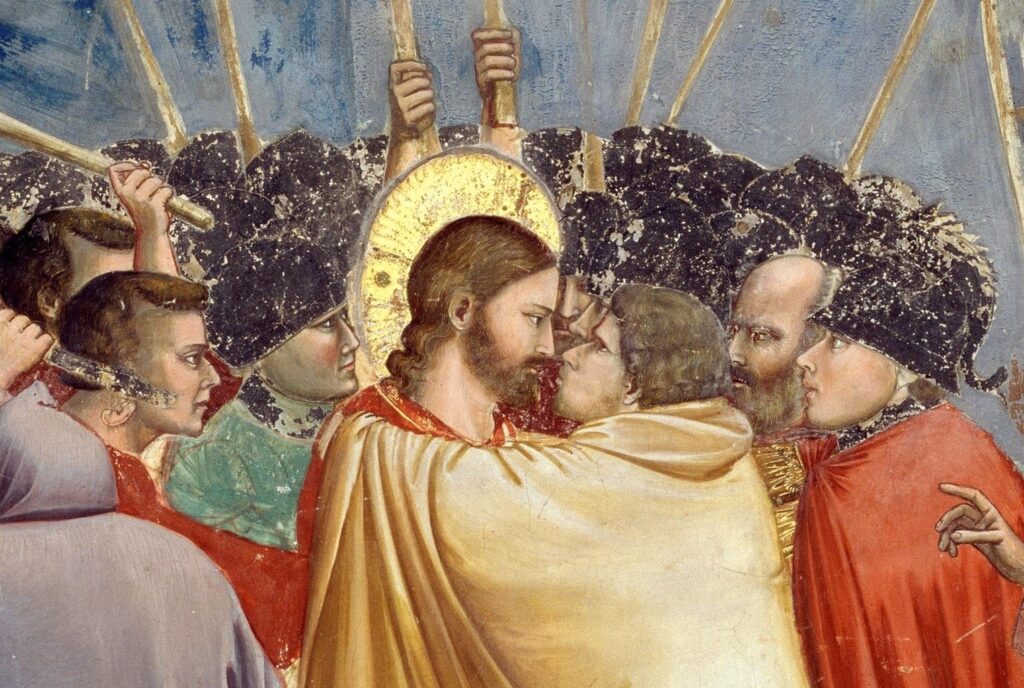
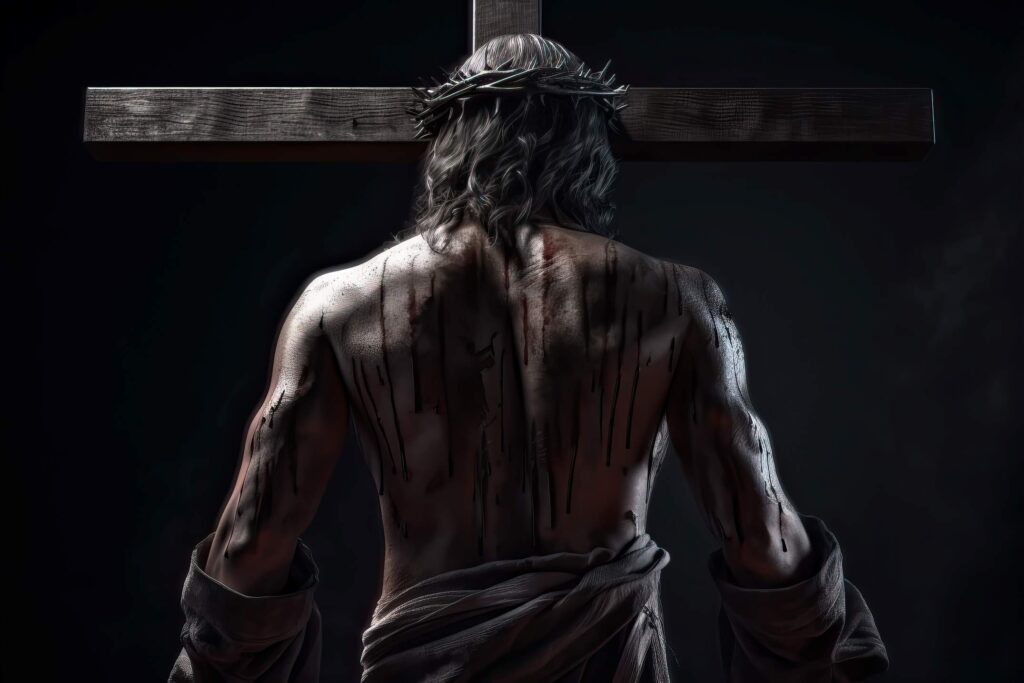
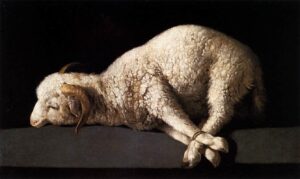
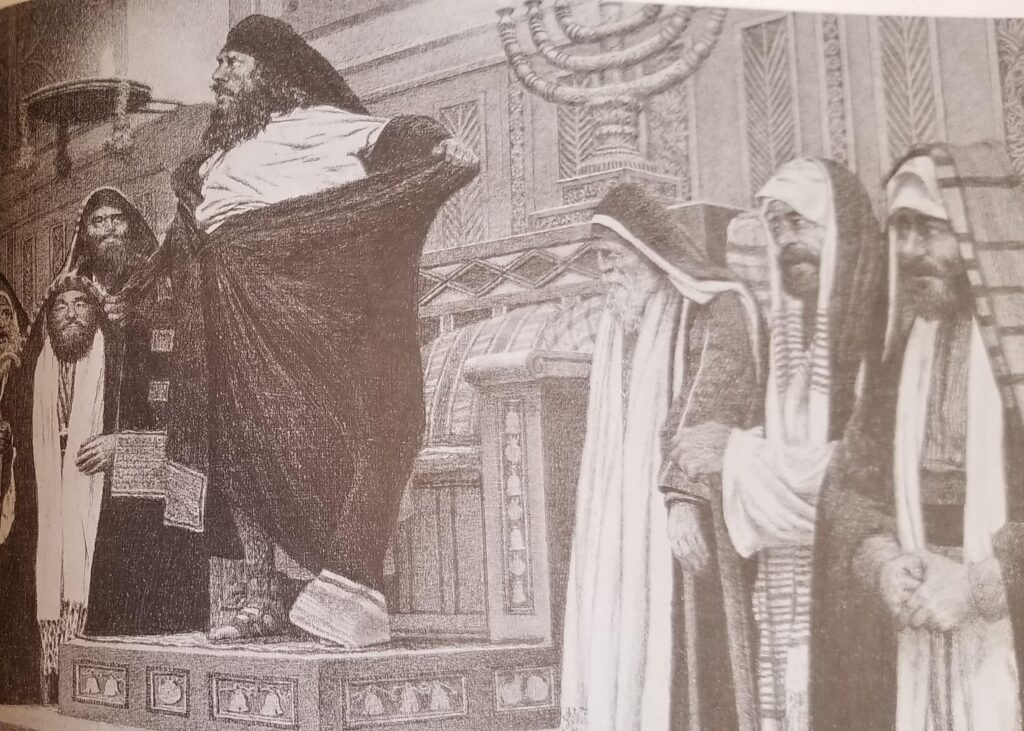
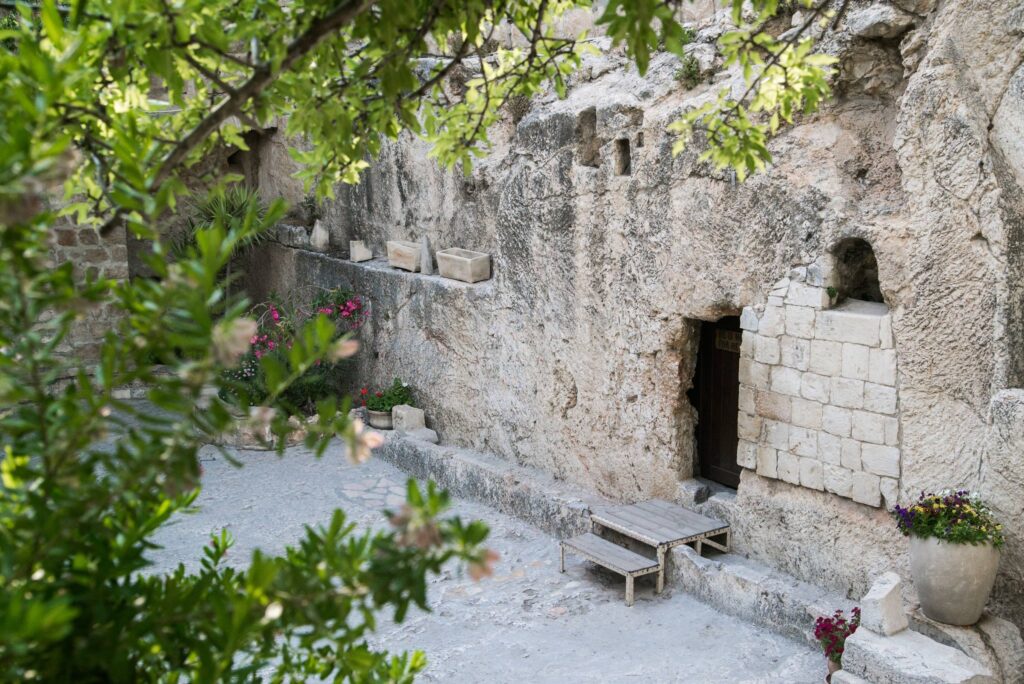
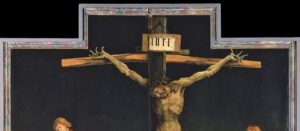
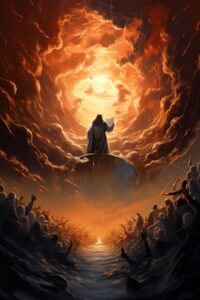
Very well done, Lael. Thanks for putting this together.
You are most welcome! It was so interesting to really dig into both accounts and see how Isaiah is more focused on *why* Jesus had to die–the theology of his suffering and crucifixion–than the gospels. Also more focused on his physical pain. The gospels only tell us he was “scourged” and “crucified.” Perhaps Psalm 22 tells us the most. The authors no doubt had different purposes in mind.
Lael! I just wanted you to know I truly enjoyed reading your post and your commentary. I especially liked how you noted that Jesus not just answered Caiaphas,”Yes, it is as you say,” to his direct charge if he is the Son of God, but for good measure, added the title of Son of Man as well. With Jesus already claiming to be one with God in John 8:58 and 10:25-33 and now claiming Messiahship with Daniel’s vision in 7:13, there is no denying Jesus’ claim to be both divine and human simultaneously. Thanks for bringing this important point to light. Blessings to you and Jack, Carlos Garza
Thanks for your kind words, Carlos, and taking the time to respond.